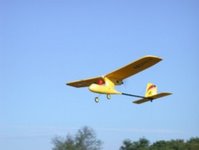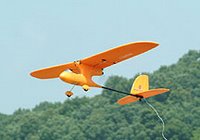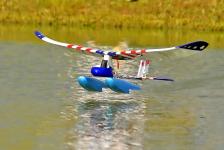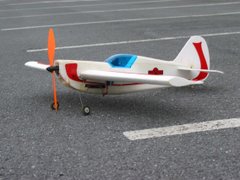 Choosing your first remote control airplane can be a daunting task. Experience has taught me that this choice is based on two questions, which each aspiring pilot must answer for him/herself. Those questions are (1) how much money am I willing to spend and (2) is this a short or long-term investment for me? The answers to these two questions will help you focus your research, resulting in the best first airplane. This post will offer you a few affordable entry-level park flyers with brushed motors, which can be flown at your local high school football field.
Choosing your first remote control airplane can be a daunting task. Experience has taught me that this choice is based on two questions, which each aspiring pilot must answer for him/herself. Those questions are (1) how much money am I willing to spend and (2) is this a short or long-term investment for me? The answers to these two questions will help you focus your research, resulting in the best first airplane. This post will offer you a few affordable entry-level park flyers with brushed motors, which can be flown at your local high school football field.The most basic airplane can be purchased for under $50 and will include all you need to get your bird in the air. The most trusted brand that I have flown is Hobbyzone. I have seen these planes crash into fences, trees, and walls and be back in the air within minutes. I can't speak highly enough about these planes. My friend Dave, a fellow pilot, learned to fly using his Hobbyzone Firebird Outlaw (see video below).
 The Firebird Outlaw, which Dave flew has been discontinued and replaced by the Firebird Scout, pictured left. You can find a review and video of the Scout on masportaviator.com.
The Firebird Outlaw, which Dave flew has been discontinued and replaced by the Firebird Scout, pictured left. You can find a review and video of the Scout on masportaviator.com.There are two negatives to these types of airplanes: (1) you can not reuse the electrical components inside if you destroy the plane and (2) they are 2-channel airplanes, which means 1-channel is dedicated to the "throttle" for the motor speed (which correlates with altitude) and the other channel is dedicated to "turning." What this means is the plane does not have an elevator and the only way to bring it back down to the ground is by slowing the motor speed -- if you are down wind on a windy day you will not be able to fly back to yourself.
$50 RTF (Ready-To-Fly) planes are perfect for those with a smaller budget, who are not sure if the hobby is for them. These planes also make great first planes for youngsters.
 The next level of investment is $89. This is the plane that I recommend most for under $100. The plane is called the Wing Dragon and is sold by hobby-lobby.com. At times, it goes on sale for $79. This package is very complete. It includes both a wall and car charger for the battery. And most importantly it includes a flight simulator, which allows you to plug the radio into your PC and fly the Wing Dragon and many models on your computer before taking it to the sky. Thirty minutes spent on a flight simulator, prior to your maiden
The next level of investment is $89. This is the plane that I recommend most for under $100. The plane is called the Wing Dragon and is sold by hobby-lobby.com. At times, it goes on sale for $79. This package is very complete. It includes both a wall and car charger for the battery. And most importantly it includes a flight simulator, which allows you to plug the radio into your PC and fly the Wing Dragon and many models on your computer before taking it to the sky. Thirty minutes spent on a flight simulator, prior to your maiden
voyage will help you immensely -- it increases your chances of a successful flight. I have personally flown this plane & the flight simulator and I am very impressed with both of them. The Wing Dragon is a 3-channel plane, which offers you full control of the aircraft. Furthermore, it is extremely durable. I have seen this plane fly 15 mph head-on into a parking lot curb and not incur any permanent damage. It has great flight characteristics. Hobbyzone also offers 3-channel planes, but they cost $140 on up; therefore for the money the Wing Dragon cannot be beat. You can find videos and a few reviews of the Wing Dragon at hobby-lobby.com.
 For $160 you can purchase a 3-channel Hobbyzone Super Cub, which is a beautiful airplane and a perfect first plane. It offers you full control with throttle, rudder, and elevator. All Hobbyzone planes come with an anti-crash technology installed to better help beginner pilots fly and there is a switch for "advanced" pilot controls. Reviews of this airplane are positive.
For $160 you can purchase a 3-channel Hobbyzone Super Cub, which is a beautiful airplane and a perfect first plane. It offers you full control with throttle, rudder, and elevator. All Hobbyzone planes come with an anti-crash technology installed to better help beginner pilots fly and there is a switch for "advanced" pilot controls. Reviews of this airplane are positive.But, before you commit to the Cub, you should also be aware that there is 4-channel Wing
 Dragon available for $140 and often less when on sale. 4-channels gives you throttle, rudder, elevator, and aileron – simply put a whole lot more control over the aircraft. The Wing Dragon 4 is capable of aerobatic flight, including inverted flight. This plane can serve as both your first and second plane, because it is 4-channel and the wings will dip when you turn and you will need to adjust the altitude accordingly. But, beware that will be more difficult to learn on than a 3-channel plane. In the long run you will save yourself $150 or more because you will NOT be buying a second plane with an additional channel -- ailerons. The Wing Dragon 4 includes the flight simulator and chargers too. Videos and photos are available at hobby-lobby.com.
Dragon available for $140 and often less when on sale. 4-channels gives you throttle, rudder, elevator, and aileron – simply put a whole lot more control over the aircraft. The Wing Dragon 4 is capable of aerobatic flight, including inverted flight. This plane can serve as both your first and second plane, because it is 4-channel and the wings will dip when you turn and you will need to adjust the altitude accordingly. But, beware that will be more difficult to learn on than a 3-channel plane. In the long run you will save yourself $150 or more because you will NOT be buying a second plane with an additional channel -- ailerons. The Wing Dragon 4 includes the flight simulator and chargers too. Videos and photos are available at hobby-lobby.com.The last level is for serious enthusiasts, who are committed for the long haul. My first plane and equipment cost about $450. I researched the planes I would like to grow into and identified what radio receiver and servos were required. I decided that I would buy a 5-channel computerized radio from the start so I would not need to upgrade my radio when I upgraded to a second or third airplane. I also bought a charger that would be able to charge many different types of batteries so I didn’t need to keep purchasing additional chargers every time I bought a new plane. I have three planes now and my radio works for all of them. I invested money upfront so I could save money in the long run.
There are so many planes to choose from at this level. I recommend that you purchase an airplane (1) made of extremely tough EPP foam, which is very easy to repair (2) with a wingspan of at least 35 inches, (3) has 3-channels: rudder, elevator, and throttle, and finally (4) has a dihedral top-mounted wing, which will provide the most stability and be forgiving in flight. Avoid ailerons to start. Avoid balsa wood planes or gas powered as well. A great plane to consider is the “Wingo USA” sold by hobby-lobby.com. You can even purchase floats for this plane and take off from and land on water.
I have spoken with many experienced pilots who regret starting off with a beautiful nitro plane as their first planes. Those planes make great third or forth upgrades. Also, please remember in this hobby you get what you pay for. Make sure to research and purchase the best plane your money can buy. If you can not find a review or a forum on the desired model at rcuninverse.com, rcworld.com, or E-Zone Mag -- don't buy it. A fellow pilot made the mistake of not purchasing a trusted brand for $80 for a 3-channel and has invested an additional $35-40 and hours of his time. In his case, purchasing a model for $80 like the Wing Dragon would have saved him a good amount of money and heart ache. For your first plane don't worry about the looks or being a "scaled model"; rather focus on stable flight characteristics and durability. You want a reliable plane to learn on.
 Bottom line -- if you plan to fly your rc airplane for the next two years, the Wing Dragon USA would be your best choice for multiple reasons: (1) easy to learn to fly on (2) super tough and easy to repair (4) spare parts available (4) versatile . . . land/water (5) will remain challenging for a couple years to fly and (6) when you upgrade your plane you can reuse the components. Check out the review and videos on rcgroups.com. There is a great video of water take-offs and landings.
Bottom line -- if you plan to fly your rc airplane for the next two years, the Wing Dragon USA would be your best choice for multiple reasons: (1) easy to learn to fly on (2) super tough and easy to repair (4) spare parts available (4) versatile . . . land/water (5) will remain challenging for a couple years to fly and (6) when you upgrade your plane you can reuse the components. Check out the review and videos on rcgroups.com. There is a great video of water take-offs and landings.
Powerful resources for you is your local RC airplane club and hobby store -- as well as rcuniverse.com, ezone mag, and masportaviator. Consider joining your local club! They will be able to train you to fly, just like driver’s ed, plugged into your radio. Many clubs have a club plane they use to teach people just like you.
Please feel free to post a comment and ask questions or make suggestions.

1 comment:
Nice site. I learned everything I know from you and think this'll be a great resource.
By the way, that Pilot Dave Eats link is awesome! That guy can really eat!
Post a Comment